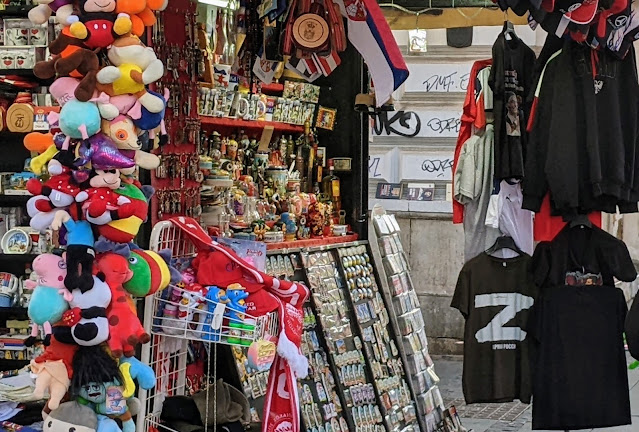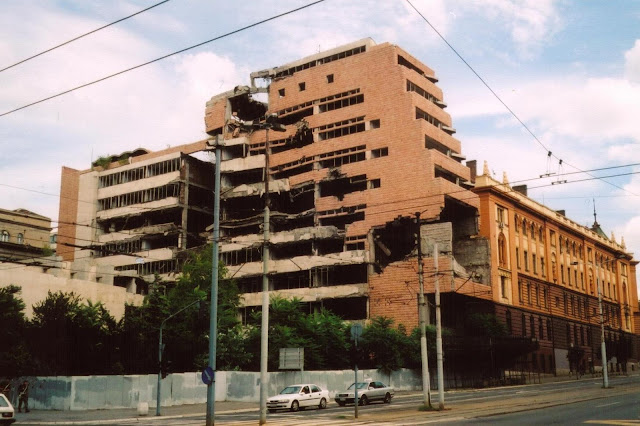 |
| U.N. peacekeepers, here a Togolese soldier near Mopti in 2018, provided enough security for local markets to function. MINUSMA (UN Mission in Mali) photo via Flickr CC BY-NC-SA 2.0 |
The Putin-backed Wagner Group is among the aggressors responsible for ongoing violence against civilians in Mali, and the United States is sabotaging its own future by ignoring the multiplying atrocities there.
As the Trump Administration cozies up to Russian President Vladimir Putin, apparently to redraw the borders of Europe Munich Agreement-style, it's worth remembering who our new partner in peace is. Correspondingly, U.S. withdrawal from U.N. aid operations suggests minding what it is we're withdrawing from.
A friend in central Mali, from a village so small it's not on Google Maps, but west of Bandiagara, wrote last week pleading for support for foreign intervention there. He reported civilians murdered and displaced and villages and food stores burned in the region in recent weeks. I am not naming my friend for his security, as he remains in the area.
 |
| Mali ECHO Base Map via GetArchive, public domain |
Human Rights Watch (HRW) confirmed in a December report:
The JNIM [al-Qaeda-linked Jama’at Nusrat al-Islam wa al-Muslimeen (Group for the Support of Islam and Muslims)] has burned homes and looted livestock in Bandiagara region since June. JNIM fighters attacked several villages in the Doucombo and Pignari Bana district areas, setting over 1,000 homes on fire, stealing at least 3,500 animals, and forcing thousands of residents to flee, according to witnesses. Residents said the attacks were in apparent retaliation against communities that the JNIM accused of collaborating with [a collective self-defense militia organized to secure area villages].
Neither side in the conflict boasts a moral record. HRW reported:
Since May 2024, Malian armed forces and the Wagner Group have deliberately killed at least 32 civilians, including 7 in a drone strike, forcibly disappeared 4 others, and burned at least 100 homes in military operations in towns and villages in central and northern Mali. Two Islamist armed groups, [JNIM] and [Group for the Support] of the Islamic State in the Greater Sahara (ISGS), have summarily executed at least 47 civilians and displaced thousands .... Human Rights Watch received credible reports of hundreds more civilians killed, but due to the difficulties of conducting research in central and northern Mali, the numbers in this report are conservative.
At the request of Malian authorities, a U.N. peacekeeping mission withdrew from Mali in December 2023 after itself coming under attack in the cross-fighting. French forces had withdrawn the previous year. The U.N. mission had been in Mali for 10 years, but its presence did not prevent two military coups in the last five years. The junta now in control of the government seems intent on extinguishing the insurgency at any cost, but it's far from clear whether either side can prevail.
The worsening situation in Mali is indicative of destabilization across west and central Africa. Military coups toppled governments in Burkina Faso in 2022 and in Niger in 2023. Now the three military governments of Burkina Faso, Niger, and Mali have withdrawn from the Economic Community of West African States (ECOWAS). Meanwhile, combatants' calls for U.N. withdrawal are growing in other hot spots, such as DR Congo, where rebels have taken the key city of Goma.
 |
| ECOWAS (2018) St.Krekeler via Wikimedia Commons CC BY-SA 3.0 |
Indicative of the progress made possible by ECOWAS, my friend in Mali messaged last year, keen to get the word out about his nascent tourism venture. Bandiagara is within a day's travel of Timbuktu, the UNESCO World Heritage Site that has been mostly inaccessible to outsiders for more than a dozen years because of armed conflict.
Now social and economic progress in the region is disintegrating.
To be clear, I do not contend that the United States or the United Nations should ride to the rescue with military force in Mali. Neither side in the conflict there wants western intervention, and we would sink into a lethal quicksand by merely adding a third side in the fighting.
However, diplomatic intervention to start with, and international peacekeeping later, could be vital to save generations of innocent people from murder, abuse, and starvation. I am mindful that my International Law class will soon study use of force, a unit that prompts sorrowful consideration of the western indifference that permitted the Rwandan genocide to play out unhindered.
HRW decried the conflict in Mali for both sides' utter disregard of "the laws of war." Between U.S. willingness to reward Putin's invasion of Ukraine with gained territory and a repeat of willful western blindness to the trampling of human rights in Africa, the entire project of international law that was built upon the ashes of World War II is now in jeopardy.
The Trump Administration seems content to let the United Nations fall by the wayside in favor of a transactional approach to foreign policy. Thus, for example, the key to a Trump peace plan in Ukraine, and any hope that Ukraine would recover lost territory in such a plan, seems to turn on a deal for U.S. access to rare-earth minerals in the country's east.
But it is in fact a transactional foreign policy that I suggest will suffer if we disregard Africa. Development of extractive industries—Mali has diamonds, gold, and uranium—is a desirable goal; the question is, who will benefit?
ECOWAS, after the model of the European economic community, and U.N. peacekeeping, which makes free trade possible, represent a west-leaning African future in which ordinary people benefit from development with rising standards of living. This isn't charity. The United States would benefit from vibrant, free-market commerce with an economically developed West Africa. All boats float.
In contrast, Russia seeks to expand its sphere of influence by undermining democratic participation and capturing governments with authoritarian oligarchy. That means an east-leaning African future in which ordinary people are subordinated and impoverished. The United States loses in that scenario; our only benefit from wealthier eastern oligarchs will be the sale of more prime U.S. property to foreign owners.
As the United Nations has been nothing but a thorn in the side of neo-imperial Russian ambitions, Putin would like nothing better than to put the organization to death. In corollary, he must be delighted by the demise of USAID, which represents our foreign policy leverage in Africa.
The United States lets its influence wane and turns its back on the world at its own peril.
Here is a list of NGOs, IGOs, and charities working in Mali.

.png)














